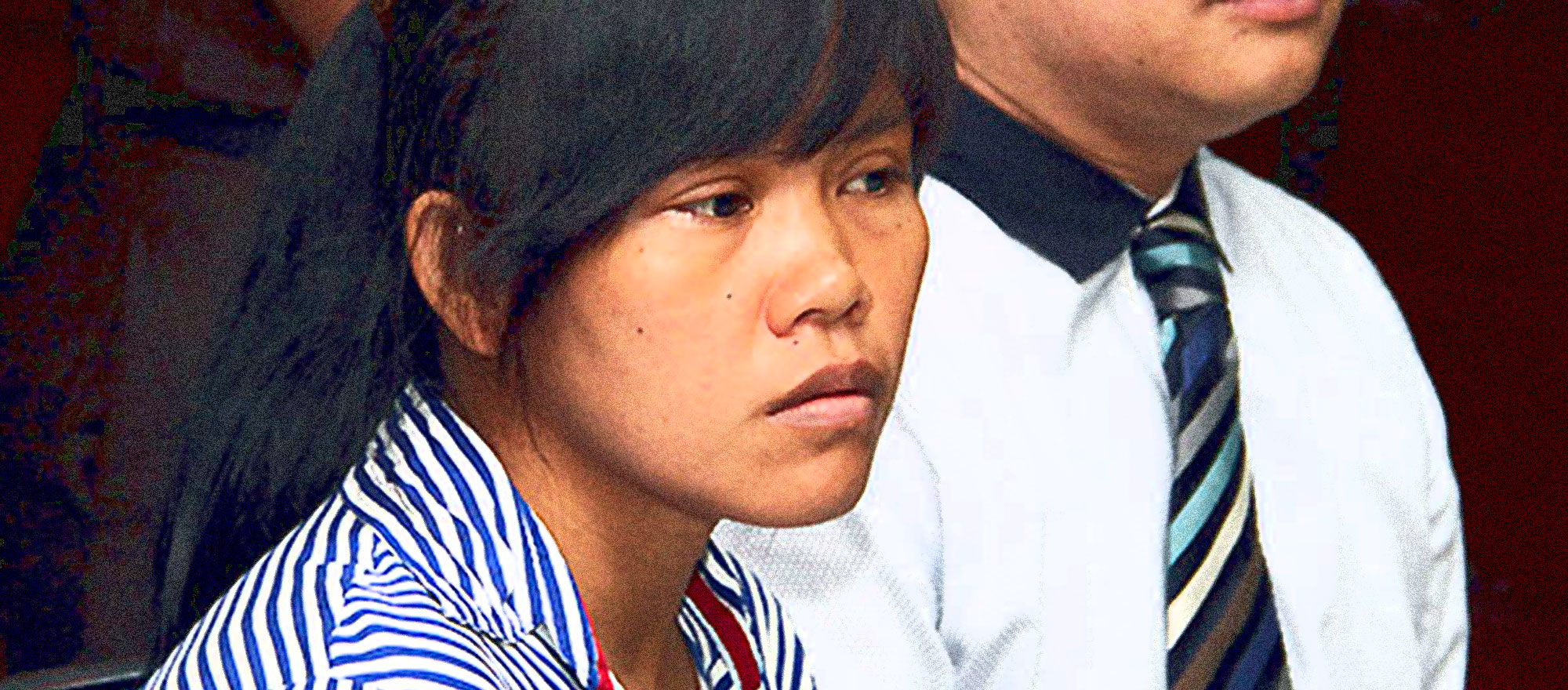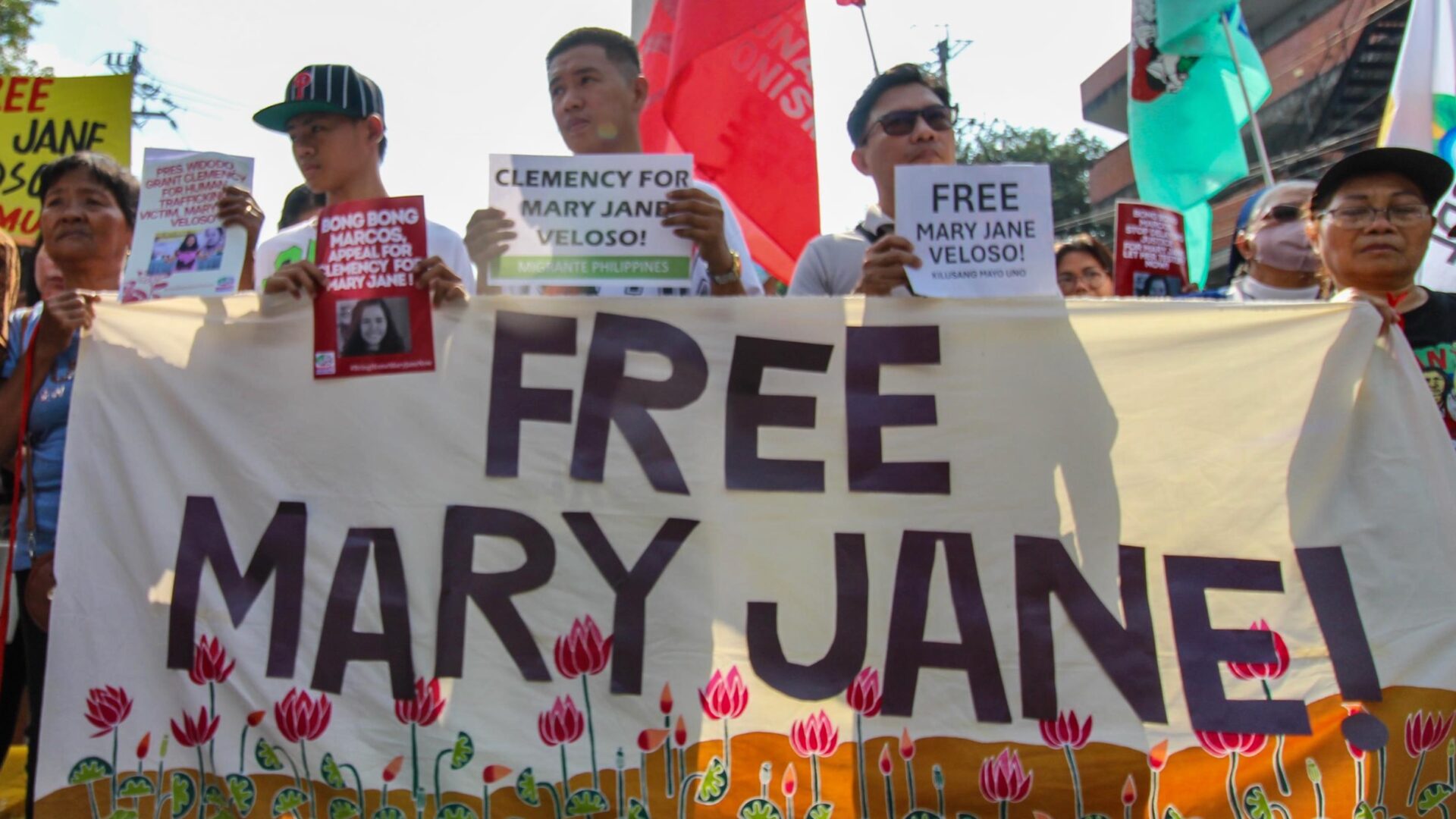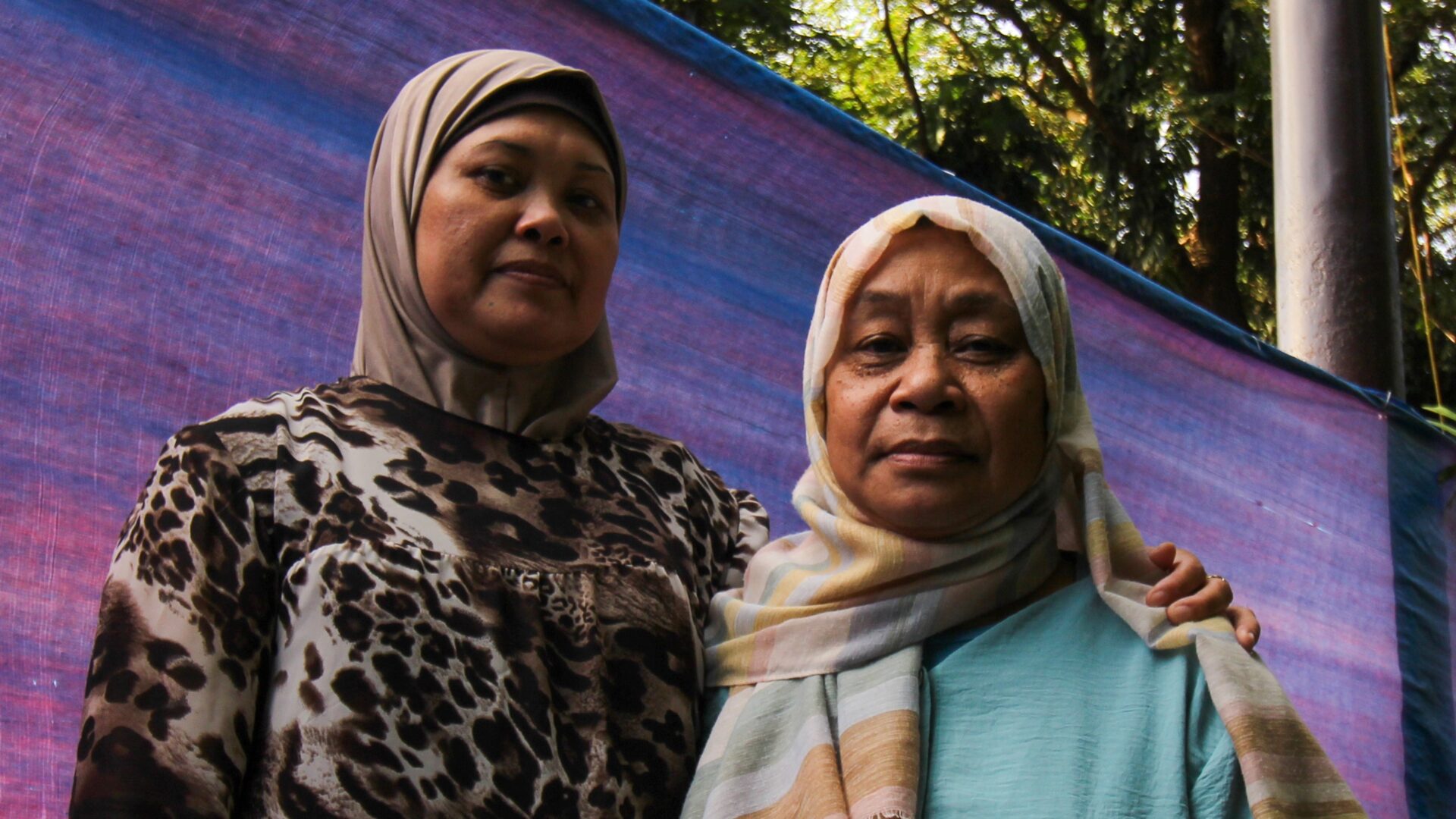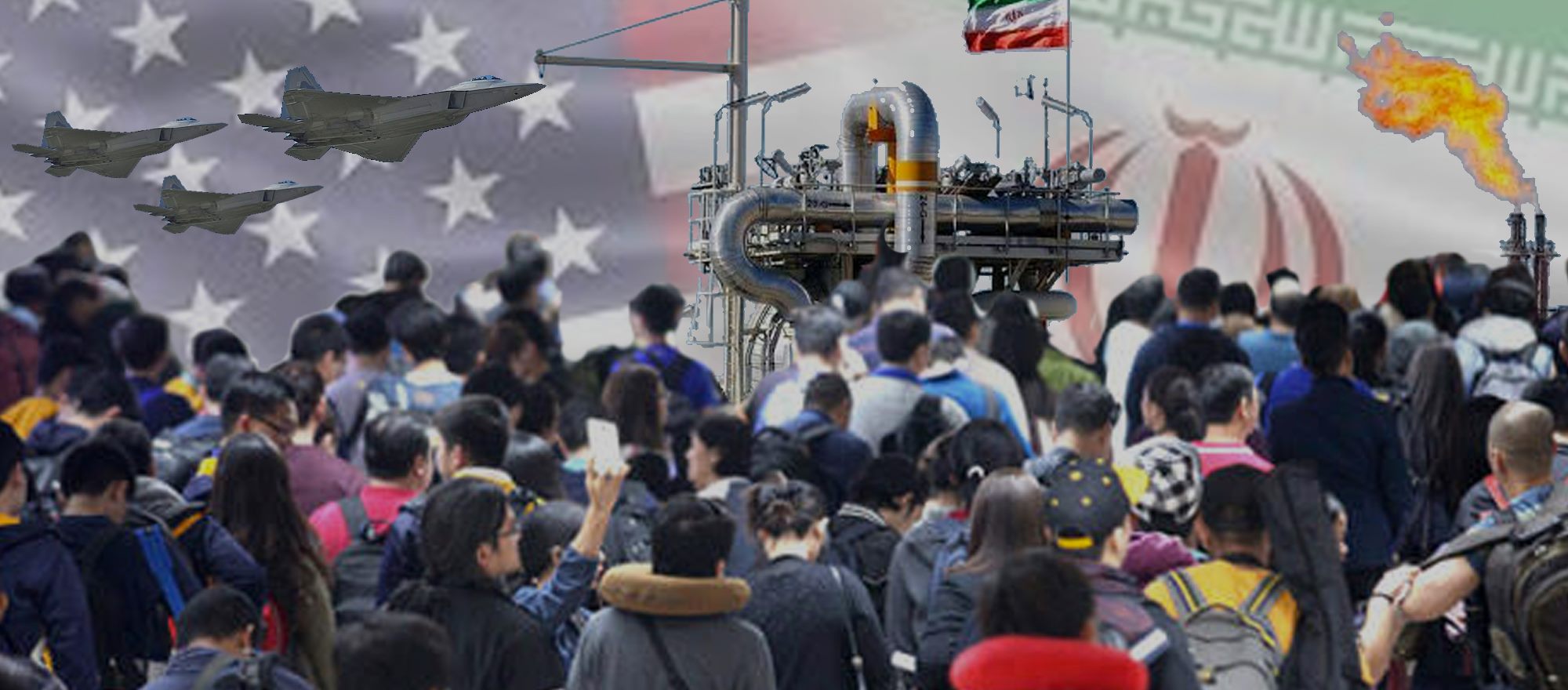How solidarity saved Mary Jane Veloso
Tireless solidarity work–not President Aquino’s supposed intervention–in different parts of the world momentarily saved Mary Jane Veloso from Death Row in Indonesia.

The prevailing story on the Indonesian government’s last-minute reprieve of Mary Jane Veloso was that President Aquino “breached protocol” to convince Indonesian Pres. Joko Widodo to turn Veloso into a “state witness” against a drug syndicate that victimized her and operates in many countries including the Philippines and Indonesia.
The Department of Foreign Affairs (DFA) spokesperson, Charles Jose, even said that the local and international protests did not have an effect on Widodo’s decision, and exclusively credited Aquino for the reprieve.
The narrative on the reprieve told by people’s organizations, including migrant and human rights organizations in the Philippines and Indonesia, as well as the Indonesian state body Komnas Perempuan (National Commission on Violence Against Women), however, challenges the Aquino government’s claims. It tells of an extensive, though decentralized, effort by many to bring to public attention, both in the Philippines and Indonesia, the case of Mary Jane Veloso and put pressure on the Philippine government to act swiftly and the Indonesian government to grant the reprieve.
It tells a story about shared struggles and experiences. It tells about the power of international solidarity.

Start of clamor
By all indications, the public clamor to stop the execution of Mary Jane Veloso started when representatives of Migrante International knocked on the doors of the Veloso family residence in Brgy. Caudillo, Cabanatuan City, Nueva Ecija on March 30.
(For a full accounting of the events of the case, from April 2010 to the stay of execution, read Migrante International’s timeline.)
Migrante International, by this time, started inquiring with fellow migrant rights advocates and organizations in Indonesia like Asosiasi Tenaga Kerja Indonesia (ATKI, Association of Indonesian Migrant Workers). On February 6, Migrante confirmed from the Indonesian groups that a certain Filipina named “Mary Jane” was indeed up for execution, pending a judicial review. The group then sought help from ATKI and other Indonesian groups in the campaign to save the Filipina on death row.
On March 9, the group mentioned Mary Jane in its statement on the sudden execution of another overseas Filipino worker, Joven Esteva, in Saudi Arabia.In its statement, the group expressed sympathy with the family, and at the same time called on the DFA to swiftly act to prevent an impending execution of another OFW, this time Mary Jane, in Indonesia.
By then the judicial review was already in the Indonesian Supreme Court. On March 25, the Supreme Court rejected the judicial review petition, which was based on claims that Mary Jane did not have a competent translator during the 2010 trial, and that she did not know either Bahasa or English well enough to understand the proceedings.
The Veloso family had just about exhausted every means it knew to save Mary Jane. In her sworn statement signed April 15, Mary Jane’s mother Celia Veloso described her family’s continued efforts for DFA, as well as Philippine Drug Enforcement Authorty (PDEA), to help her daughter since 2010. In at least one instance, said Celia, DFA case officer Patricia Mocom even told her to keep away from media.
That there was no public knowledge or interest on Mary Jane’s case, both in the Philippines and Indonesia until the migrant groups stepped in was evident when Indonesian Pres. Joko Widodo officially visited the Philippines on February 9. One agenda in Widodo’s state visit was the signing of a joint declaration on the protection of migrant workers between the two countries. Despite this, however, the Aquino administration did not confirm or deny at that time if Mary Jane’s case was discussed in Aquino’s meeting with Widodo. In Philippine media reports, Malacanang even declined to mention Mary Jane’s name.
(The timeline prepared by the DFA, released just this May 4, claims that Aquino mentioned Mary Jane’s case to the visiting Indonesian president. But news reports, both in the Philippines and Indonesia, do not corroborate this. In fact, Aquino’s official statement during Widodo’s official state visit did not mention the case at all.)
After Migrante stepped in and met the Velosos on March 30 came a series of protest actions and activities to drumbeat public interest on Mary Jane’s case.

‘We can relate to her’
By the first week of April, Indonesian groups were already hard at work disseminating information on Mary Jane’s case. According to Connie Bragas-Regalado of Migrante International, before the Indonesian groups like ATKI stepped in, the Indonesian public hardly knew anything about Mary Jane. Those who knew about her case only knew her as one of those set to be executed for drug trafficking.
“Before, the Indonesian community did not really know about Mary Jane,” said Ini Iwenki of ATKI’s Indonesian chapter, in an interview with Pinoy Weekly. “Her name came out on March 2015, when the Attorney General’s Office included her name as one of those who will be meted the death penalty. Then, all people knew was that she brought heroin to Indonesia.”
Widodo’s campaign against drug trafficking then was popular among the Indonesian public, said Eni Lestari, chairperson of International Migrants’ Alliance (IMA), and herself an Indonesian migrant worker in Hong Kong. “Since drug related issues is hot topic in Indonesia, everyone tried not to talk about it—although many opposed death penalty of the Indonesian government,” she said.

Among the first to be approached by ATKI was Komnas Perempuan (National Commission on Violence Against Women, a state institution comparable in the Philippines to the government institution Philippine Commission on Women). Komnas Perempuan has been one of the most active institutions that advocated against the death penalty in Indonesia, as well as for the protection of Indonesian migrant workers abroad.
In an interview with Pinoy Weekly, Yuniyanti Chuzaifah, Komnas Perempuan vice-chairperson, said that they received a letter (apparently from ATKI) seeking support for Mary Jane’s case during the first week of April. “We discussed (among ourselves) the case and we sent a letter to President (Widodo) to delay the execution,” said Chuzaifah.
Not content with merely submitting a letter to Widodo, Komnas Perempuan decided to conduct a fact-finding mission on Mary Jane’s case. Chuzaifah, with her team, went to Yogjakarta to personally interview Mary Jane.
“During the first day, Mary Jane was emotional in telling her story and saying she was not guilty. The second day, we started to discuss with the lawyer, in detail, her story since the beginning. We tried to explore the trafficking dimension, (Mary Jane) as a woman, a mother, a member of a poor family, as well as her married life – really detailed. We did a comprehensive report on her experience and story,” Chuzaifah said.
They then sent a second letter to Widodo. This time, the letter contained Komnas Perempuan’s fact-finding report.
On April 24, Komnas Perempuan, together with another state body, Komnas Ham (Komisi Nasional Hak Asasi Manusia, or National Commission on Human Rights—akin to the Philippines’ Commission on Human Rights) and two Indonesian representatives to Association of Southeast Asian Nations or Asean mechanisms (Asean Intergovernmental Commission on Human Rights or AICHR, and Asean Commission on the Promotion and Protection of the Rights of Women and Children or ACWC) held a press conference in Jakarta. Its aim was to gather public support for the campaign to save Mary Jane’s life.
Chuzaifah said the presscon was also designed to reach President Widodo himself. “We sent formal letters, but we thought media was the faster messenger to the President,” she said.
By April 25, the day the 72-hour countdown until the execution of the nine death convicts (including Mary Jane) began, ATKI and the women’s and migrant groups, as well as other groups and concerned individuals, began holding a vigil in front of the Widodo’s presidential residence. They reportedly lit a thousand candles to dramatize what by then was already a popular clamor to save Mary Jane from the firing squad.
“They held a candlelighting right in front of the Presidential Palace. It was scary, because of the military in the streets. So of course, it was dispersed. A Migrante member even broke a finger during the dispersal,” said Migrante’s Connie Bragas-Regalado.

Gathering storm
At that time, Regalado was already with the Velosos, as well as lawyers of the National Union of People’s Lawyers. They were gathering further support from other Indonesian groups, including church-based organizations.
Regalado, together with Mary Jane’s sister Maritess, arrived in Jakarta on April 18. They immediately linked up with ATKI, and informally met Philippine embassy officials. In gathering support, Migrante even sought the help of the Jakarta chapter of the University of the Philippines Alumni Association, whose leaders said they were unaware (and uninformed by the Philippine embassy) of Mary Jane’s case. The UP alumni pledged support for the campaign.
Regalado said they also met with representatives of Komnas Perempuan on April 20.
When NUPL lawyers Edre Olalia and Minerva Lopez arrived in Jakarta on April 21, they already talked with Indonesian lawyers under Rudyantho and Partners (lawyers hired by the Philippine embassy and represented Mary Jane since the appeals stage). In this meeting, the Indonesian lawyers related to Olalia and Lopez that since 2011 they already asked the Philippine embassy to investigate a certain Maria Cristina Sergio who recruited Mary Jane and deceived her into using a luggage that contained a 2.6-kilo heroin.
“Rudyantho and Partners had already requested the Aquino government to investigate Sergio even before the filing of the first petition for judicial review. This would have been instrumental for the appeal,” said Migrante International, in a statement. “They (the Indonesian lawyers) were dismayed to learn that the Philippine government only attended to this after the judicial review had been rejected by the Indonesian Supreme Court on March 25.”
In other words, the Philippine embassy practically sat on Mary Jane’s case since 2010 and left it up to Indonesian lawyers since 2011—not even employing PDEA to pursue leads on Sergio in the Philippines. (In her affidavit, Celia Veloso said she contacted the National Bureau of Investigation as far back as 2010 and PDEA in 2011. She also detailed how the DFA kept on giving her the runaround everytime she followed up on the case.)
Meanwhile, the Indonesian groups led by ATKI were already launching a series of protest actions for Mary Jane. All the efforts at bringing the issue to the streets came to a head on April 26, after the announcement of a 72-hour countdown until execution was made. The vigil was attended by many organizations.
“At the time, we (already) got a good response from the public. It became a trending topic (in social media). It became an eye opener to the public on the issue of death penalty (in Indonesia),” said Komnas Perempuan’s Chuzaifah. She also claimed that before the campaign to save Mary Jane, about “70 percent of the public supported death penalty”. But because of the campaign, “it became about 30 percent”.
All these events were happening while Widodo was at the Asian-African Conference, and then at the Asean Summit in Kuala Lumpur, Malaysia. But apparently, he was taking notice of the events in Jakarta.

Pressure in KL
On April 20, leaders of Migrante International, the Philippine women’s alliance Gabriela, the human rights organization Karapatan, and other Philippine and regional groups, went to Kuala Lumpur for pre-forum activities of the Asean People’s Forum.
In a roundtable discussion attended by Indonesian organizations including Komnas Perempuan, Gabriela mentioned the case of Mary Jane. On April 21, at the talk show of the Asean Women’s Forum, Gabriela’s Joms Salvador and IMA’s Lestari also discussed the case, and began distributing paraphernalia on the campaign. It was attended by about 400 participants, including Indonesian NGOs.
On April 24, an Asean People’s Forum (APF) event that supposedly featured Pres. Bengino Aquino III was organized. With Aquino unable to attend the event, Social Welfare Sec. Dinky Soliman came to represent the Philippine President. By that time, many attendees had already come to know about Mary Jane’s case. Gabriela and IMA, among others, boycotted Soliman’s talk. Together with other groups like the Asia Pacific Forum on Women, Law and Development (APWLD), among others, they instead picketted outside the venue to further publicize Mary Jane’s case.

“We were appalled that the APF invited Aquino. So when Soliman was about to talk, we timed our picket so she can hear our protests, and at the same time Asian attendees can hear us talk about what has been happening in the Philippines (regarding Mary Jane’s case),” recounted Joan Salvador, Gabriela’s international relations officer, who was at the event.
On April 27, before Widodo left the Asean Summit for Jakarta, delegates of the Asean Youth Forum (whose delegates were also present in the pre-forum meetings) personally handed the Indonesian President a letter asking for stay of Mary Jane’s execution.
This was even before Aquino’s five-minute chat with Widodo in the morning. Aquino allegedly talked about the case. By the afternoon, Widodo had an answer to the Philippine President, which was that in his mind at that point still, the clemency appeal had no basis. In the afternoon, he left Kuala Lumpur for Jakarta, which, by this time, was now abuzz with protests and vigils for Mary Jane.

New appeal
Meanwhile, in Kuala Lumpur on the morning of 28th, President Aquino—who by this time was now armed with information on the arrest of Sergio—called Indonesian Foreign Minister Retno Marsudi about the possibility of turning Mary Jane into a “state witness” against the drug syndicate that victimized her.
The Philippine government’s new position on Mary Jane as a human trafficking victim certainly put credence to Mary Jane’s claims since her arrest in Yogjakarta in 2010. However, these were the very same claims that Philippine government agencies DFA, NBI and PDEA refused to investigate on because “they had no evidence”, Celia Veloso quoted the agencies’ officials as saying.
During the phone call, when Masrudi asked Aquino why the claim that Mary Jane was a human trafficking victim was raised only now, the Philippine President went on to blame Mary Jane herself. “We discovered that she wasn’t cooperating initially, and she is now very cooperative. We have the opportunity in our case to get the necessary evidence to successfully prosecute the illegal recruiters,” Aquino said.
This was, of course, disputed by Mary Jane’s Filipino lawyers, who said that she fully cooperated from the day she got contact with the Philippine embassy after her arrest. NUPL’s Olalia said that the Indonesian lawyers under Rudyantho and Partners said they had asked embassy officials to investigate Mary Jane’s claims since 2011.
12. sikap menolak hukuman mati bukan berarti setuju peredaran narkoba! pic.twitter.com/8nIYVPDmUo #BatalkanHukumanMati
— Komnas Perempuan (@KomnasPerempuan) April 28, 2015
Consulting with labor groups
Meanwhile late evening of April 27, the president’s staff called representatives of various NGOs, purportedly for a meeting on the upcoming Labor Day celebrations. One of those contacted was Anis Hidayah, executive director of Migrant Care, which was one of the NGOs that answered Komnas Perempuan, ATKI and Migrante International’s call to help save Mary Jane’s life.
In a report from Rappler Indonesia, Anis explained that she had to catch a midnight train ride from Jember, Central Java to Jurabaya that evening, and then flew to Jakarta in order to arrive in time for the meeting with Widodo. She knew that Mary Jane’s case would be in the discussion.

During the meeting, Anis said she could not help but cry when asked about the case. She recalled the case of Siti Zaenab, an abused Indonesian migrant worker accused of murder in Saudi Arabia whom Anis personally campaigned to save from execution. Zaenab was eventually beheaded by the Saudi government.
The report said that Widodo was “irritated” that he only came to know that day about the possibility that Mary Jane might be innocent—after he had already repeatedly denied clemency appeals from the Aquino government. This echoed Attorney General H.M. Prasetyo’s statement questioning claims that Mary Jane was a victim of human trafficking because it surfaced only a few days before the scheduled execution.
(By all indications, the Widodo government was only informed of the possibility that Mary Jane was a victim of human trafficking after the filing of the second judicial review, in April 24, 2015. The Philippine embassy, pressured by Migrante and NUPL, was only able to submit a Bahasa translation on the PDEA report on Mary Jane’s claims at the last minute, April 23. The Aquino government, in its previous clemency appeals—DFA claimed that the Aquino government appealed four times—asked Widodo to grant clemency on humanitarian grounds, not on the basis that Mary Jane may possibly be a human trafficking victim. As with other diplomatic appeals based on humanitarian grounds from Australia and Brazil, Widodo dismissed them.)
For her part, Chuzafìah said she used her connections in the inner circle within the Widodo administration to ensure that Komnas Perempuan’s fact-finding report on Mary Jane, as well as news on Sergio’s surrender from the Philippines’ Department of Justice, were in Widodo’s hands.
After the meeting with the NGOs, and still without a decision on the matter, Prasetyo declared that their government would go ahead with the executions. But after 5pm and even with Prasetyo affirming the executions, Widodo was already in consultation with other officials, namely Cabinet Secretary Andi Widjajanto and officials from Indonesia’s National Narcotics Agency. By this time, news had arrived to them about the supposed surrender of Sergio to Philippine authorities.
The Philippines’ DFA had already publicly stated that legal and diplomatic efforts to save Mary Jane had failed. But Chuzaifah had confidence that there was possibility of a reprieve. This was also relayed by Mary Jane’s Filipino lawyers to hundreds of supporters outside Indonesian embassy in Makati City, Philippines who were in vigil. She said that although many members of Widodo’s inner circle were in favor of the death penalty, there were some like Cabinet Secretary Andi Widjajanto who were open to dialogue with the labor and migrant groups.
Chuzaifah revealed to Pinoy Weekly that by 10pm of April 28, within hours of the executions, “a source” within Widodo’s inner circle related to her the possibility of a reprieve.
“Around 10pm, we heard an important message, that possibly the President (Widodo) would change his mind. I got this information but (was told not to) share this because it was still in the process,” Chuzaifah said. The source, she said, was “a very important person from the circle of the President”.
“They said that the President was asking a very important person and that this important person said that ‘Mr. President, you have to decide correctly based on your heart.’ This is my language, but more or less like that,” she added.
The executions were to commence by midnight. From many accounts, it was before midnight, as the death convicts were on their way to the execution site, that Mary Jane was stopped. She was informed then by the Indonesian authorities that her execution would be stayed.
This development was relayed to Indonesian media several minutes later, and eventually to the attendees of the vigil in Makati City by around 1:30 in the morning. The DFA would officially announce the stay of execution at around 2:30am.

Family struggles
During the press conference at the Migrante office on May 1, the Velosos recounted their own ordeal with the embassy officials.
Cesar Veloso, father of Mary Jane, narrated that the DFA tried to separate them from their lawyer Olalia. “They held my hand and kept pulling me inside. But I kept on calling on attorney (Olalia). I struggled and was able to free myself, which is why I was able to talk to attorney (for his legal advice),” said Cesar.
The Veloso family also decried the DFA’s apparent lack of sympathy for them in talking with them about funeral arrangements even after news of Sergio’s surrender opened up possibility that Mary Jane would be reprieved. “They had a list for the expected wake of Mary Jane. It was detailed there (in the list) that there would be a mass. It detailed what casket would be used, what funeral parlor—it was a complete list,” said Maritess Veloso, sister of Mary Jane. “When they asked for a meeting, we thought we would be talking about the surrender of Sergio, that there would be hope. But we talked about Mary Jane’s wake.”
Maritess also narrated the rollercoaster of emotions during the night of the 29th. At past 11pm, the was told that Mary Jane wanted to see her. But it was the Yojakarta high prosecutor who talked with her. But Maritess said she did not understand the high prosecutor, who talked in Bahasa. Meanwhile, Consul General Roberto Manalo, who by then had already known of the stay of execution, didn’t inform her and Darling (Mary Jane’s other sister who was at the island during the time of execution) that Mary Jane was not among those to be executed. Instead, she said they were left to hear the gunshots and thought that Mary Jane was already executed.
“We were holding hands together with my sister Darling. Then we heard a gunshot… I was crying, screaming Mary Jane’s name, asking why she wanted to see me. I will never forget when I heard those gunshots,” said Maritess.
They later came to know about the reprieve. Mary Jane lived, and the world who helped her win a repreive celebrated her temporary triumph.




